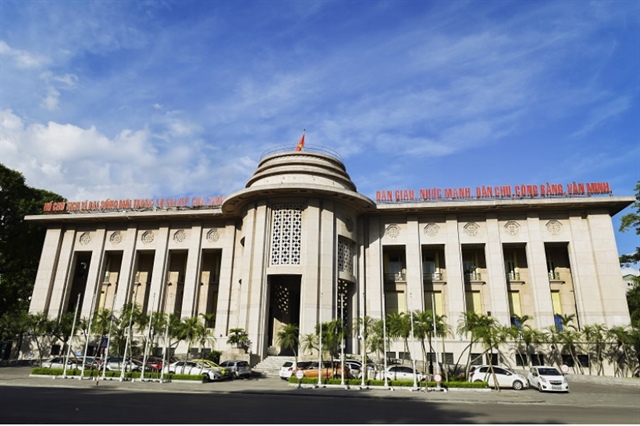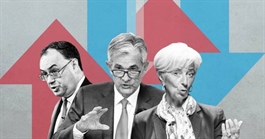Vietnam c.bank raises policy rates first time in two years
Vietnam c.bank raises policy rates first time in two years
A higher interest rate cap would have a direct impact on banks, businesses, and people.
For the first time in two years, the State Bank of Vietnam (SBV), the country’s central bank, decided to raise its policy rates, which takes effect today [September 23].

The central bank's headquarter. Source: SBV |
As per the decision, the interest rate cap has been raised to 5% annually from 4% for deposits with maturities of one month to less than six months, while the maximum rate for deposits with maturities of one month to less than six months at people’s credit funds and microfinance services is set at 5.5% per annum.
The deposit interest rate cap with maturities of less than one month and demand deposits are slightly increased to 0.5% from 0.2%.
The refinancing interest and rediscount rate have been raised by one percentage point to respective 5% and 3.5% per annum, and overnight interest rate and interest via open market operations (OMO) climbed to 6% per annum from the previous 5%.
The decision came following US Federal Reserve (FED)’s latest move to raise its policy rates for the third consecutive time by 75 basic points, aiming to curb inflation.
According to experts, SBV’s raising policy rates would send a message of more expensive capital for commercial banks and limited liquidity of the Vietnamese Dong (VND) on the market.
The move, however, is deemed inevitable as FED has been keeping raising interest rates, subsequently putting pressure on exchange rates.
While a refinancing and rediscount rate hike is not expected to have much impact on the economy, a higher interest rate cap would have a direct impact on banks, businesses and individuals.
In this context, banks would have to pay more to mobilize capital, leading to higher lending rates. But in a recent meeting, Prime Minister Pham Minh Chinh instructed commercial banks to optimize operational costs and keep the average lending rate stable to aid businesses and people.
Prospects for local stock market remain bright
VNDirect in its latest report noted SBV’s raising rate is a timely move, amid the fast-changing situation in the global finance market.
The securities firm also suggested a 100 basis point increase is higher than the market’s anticipation at 0.5 percentage points.
After this rate hike, VnDirect suggested it is unlikely that there would be another move this year.
Sharing the view, Dragon Capital noted FED has sent a signal on a halt in a rate hike in the first half of 2023, for which it added investors may expect a period of stability in Vietnam’s monetary policy management.
The investment fund also said in an environment of rising interest rates, expected profit in the stock market might not be as high as in the previous period.
“In the short-term, the performance of the stock market may depend on the global situation,” stated Dragon Capital, but noted external factors may not have significant impacts on Vietnam compared to other emerging economies.
“VnIndex may maintain its 1,200-mark for this year,” it added.
The price-to-earning (P/E) of VnIndex may revert back to 12.1x after the disclosure of business performance in the third quarter, but still higher than the 10.4x during the Covid-19 outbreak in March 2020.
“Vietnam’s stock market has potential for higher profit compared to emerging markets, while risks are considered lower thanks to strong economic fundamentals,” stated Dragon Capital.
Dragon Capital forecast Vietnam’s GDP growth in the third quarter could be a two-digit number and end the year at a 7.8% expansion rate. This would help the P/E forward in 2022 at 10. x and growth of earnings per share (EPS) at 17%.
In an even more optimistic view, Pyn Elite Fund forecasts the profit growth of public companies in Vietnam in 2022 could be at 25%, given Vietnam’s positive economic outlook in subsequent years.






















